Leadership and Management of Service Industry: Comprehensive Report
VerifiedAdded on 2022/12/26
|20
|6681
|46
Report
AI Summary
This report provides a comprehensive analysis of leadership and management within the service industry, with a specific focus on the InterContinental Resort (IHG). It begins by assessing classical management theories, such as scientific, administrative, and bureaucracy theories, and their applicability within a service context. The report then explores various leadership styles, including democratic, autocratic, transformational, and coaching styles, and examines their implementation within IHG. It reviews the management and leadership approaches of IHG, linking them to relevant theories and providing evidence of organizational practices, including organizational structure and culture. The report further investigates internal and external factors influencing management styles and structures, critically analyzing changes influenced by these factors. It also assesses current and future management and leadership skills, and compares change management systems and leadership in implementing change within different service industry organizations. The analysis includes a critical evaluation of how management and leadership skills have evolved in response to change, offering insights into the dynamic nature of the service sector.
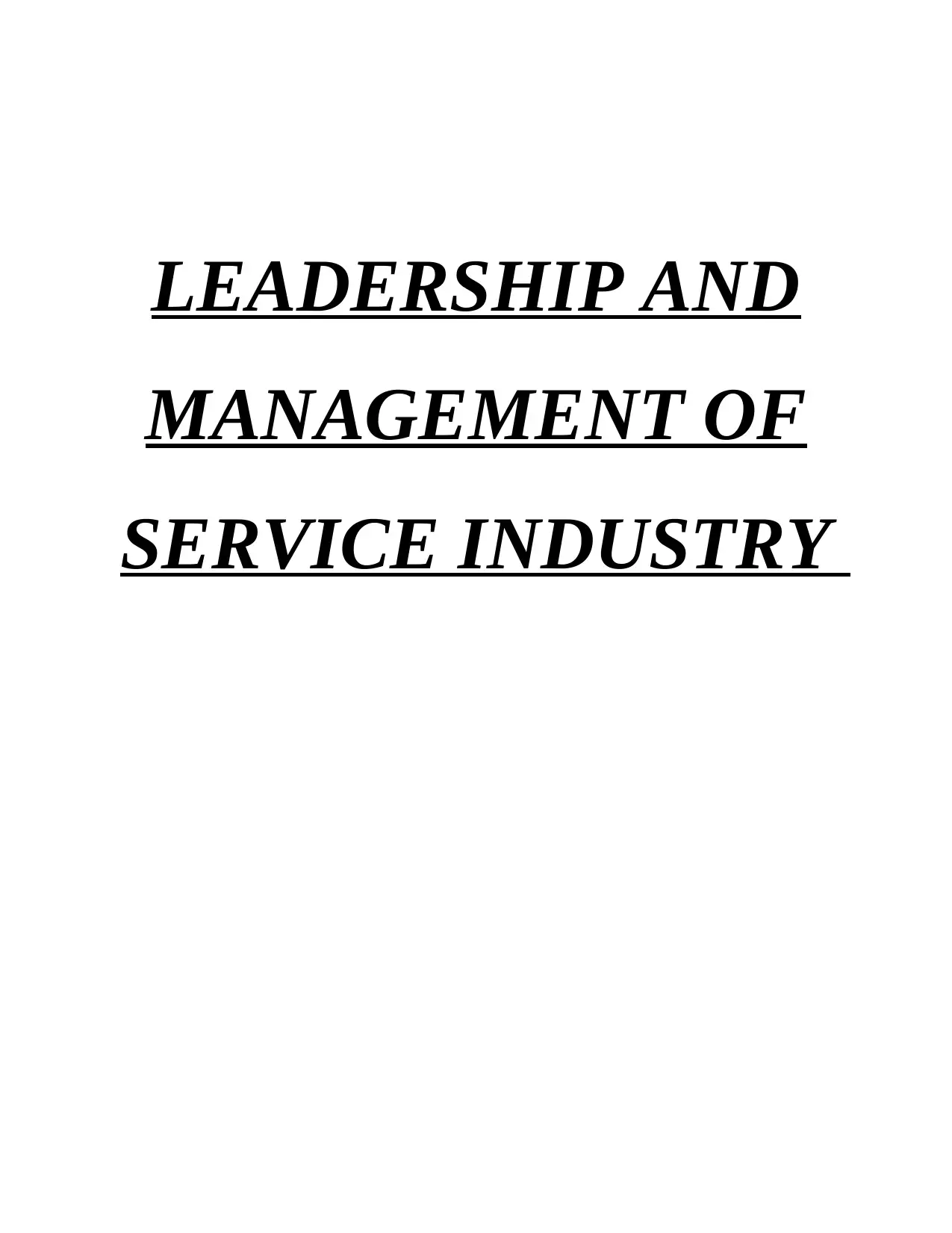
LEADERSHIP AND
MANAGEMENT OF
SERVICE INDUSTRY
MANAGEMENT OF
SERVICE INDUSTRY
Paraphrase This Document
Need a fresh take? Get an instant paraphrase of this document with our AI Paraphraser
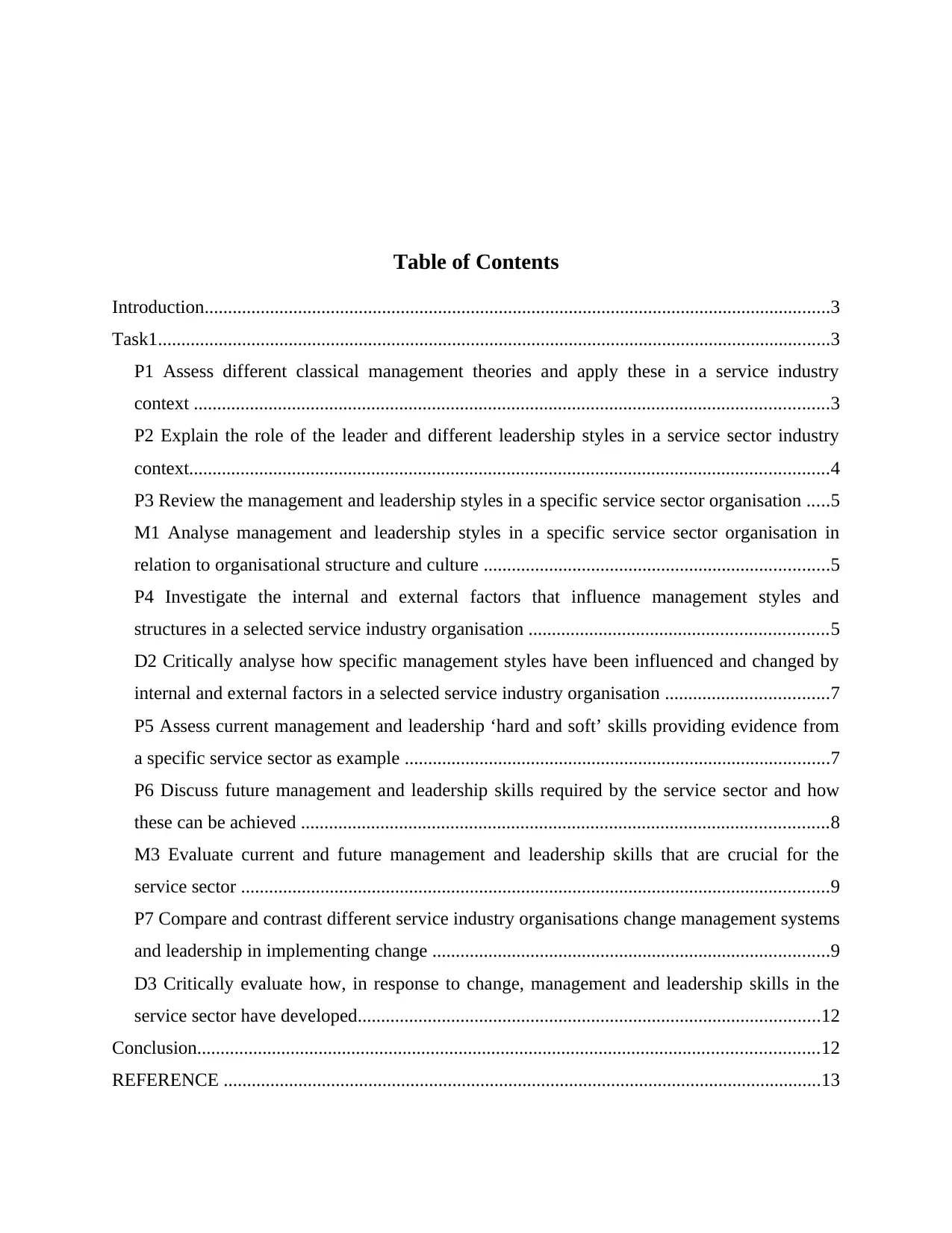
Table of Contents
Introduction......................................................................................................................................3
Task1................................................................................................................................................3
P1 Assess different classical management theories and apply these in a service industry
context ........................................................................................................................................3
P2 Explain the role of the leader and different leadership styles in a service sector industry
context.........................................................................................................................................4
P3 Review the management and leadership styles in a specific service sector organisation .....5
M1 Analyse management and leadership styles in a specific service sector organisation in
relation to organisational structure and culture ..........................................................................5
P4 Investigate the internal and external factors that influence management styles and
structures in a selected service industry organisation ................................................................5
D2 Critically analyse how specific management styles have been influenced and changed by
internal and external factors in a selected service industry organisation ...................................7
P5 Assess current management and leadership ‘hard and soft’ skills providing evidence from
a specific service sector as example ...........................................................................................7
P6 Discuss future management and leadership skills required by the service sector and how
these can be achieved .................................................................................................................8
M3 Evaluate current and future management and leadership skills that are crucial for the
service sector ..............................................................................................................................9
P7 Compare and contrast different service industry organisations change management systems
and leadership in implementing change .....................................................................................9
D3 Critically evaluate how, in response to change, management and leadership skills in the
service sector have developed...................................................................................................12
Conclusion.....................................................................................................................................12
REFERENCE ................................................................................................................................13
Introduction......................................................................................................................................3
Task1................................................................................................................................................3
P1 Assess different classical management theories and apply these in a service industry
context ........................................................................................................................................3
P2 Explain the role of the leader and different leadership styles in a service sector industry
context.........................................................................................................................................4
P3 Review the management and leadership styles in a specific service sector organisation .....5
M1 Analyse management and leadership styles in a specific service sector organisation in
relation to organisational structure and culture ..........................................................................5
P4 Investigate the internal and external factors that influence management styles and
structures in a selected service industry organisation ................................................................5
D2 Critically analyse how specific management styles have been influenced and changed by
internal and external factors in a selected service industry organisation ...................................7
P5 Assess current management and leadership ‘hard and soft’ skills providing evidence from
a specific service sector as example ...........................................................................................7
P6 Discuss future management and leadership skills required by the service sector and how
these can be achieved .................................................................................................................8
M3 Evaluate current and future management and leadership skills that are crucial for the
service sector ..............................................................................................................................9
P7 Compare and contrast different service industry organisations change management systems
and leadership in implementing change .....................................................................................9
D3 Critically evaluate how, in response to change, management and leadership skills in the
service sector have developed...................................................................................................12
Conclusion.....................................................................................................................................12
REFERENCE ................................................................................................................................13
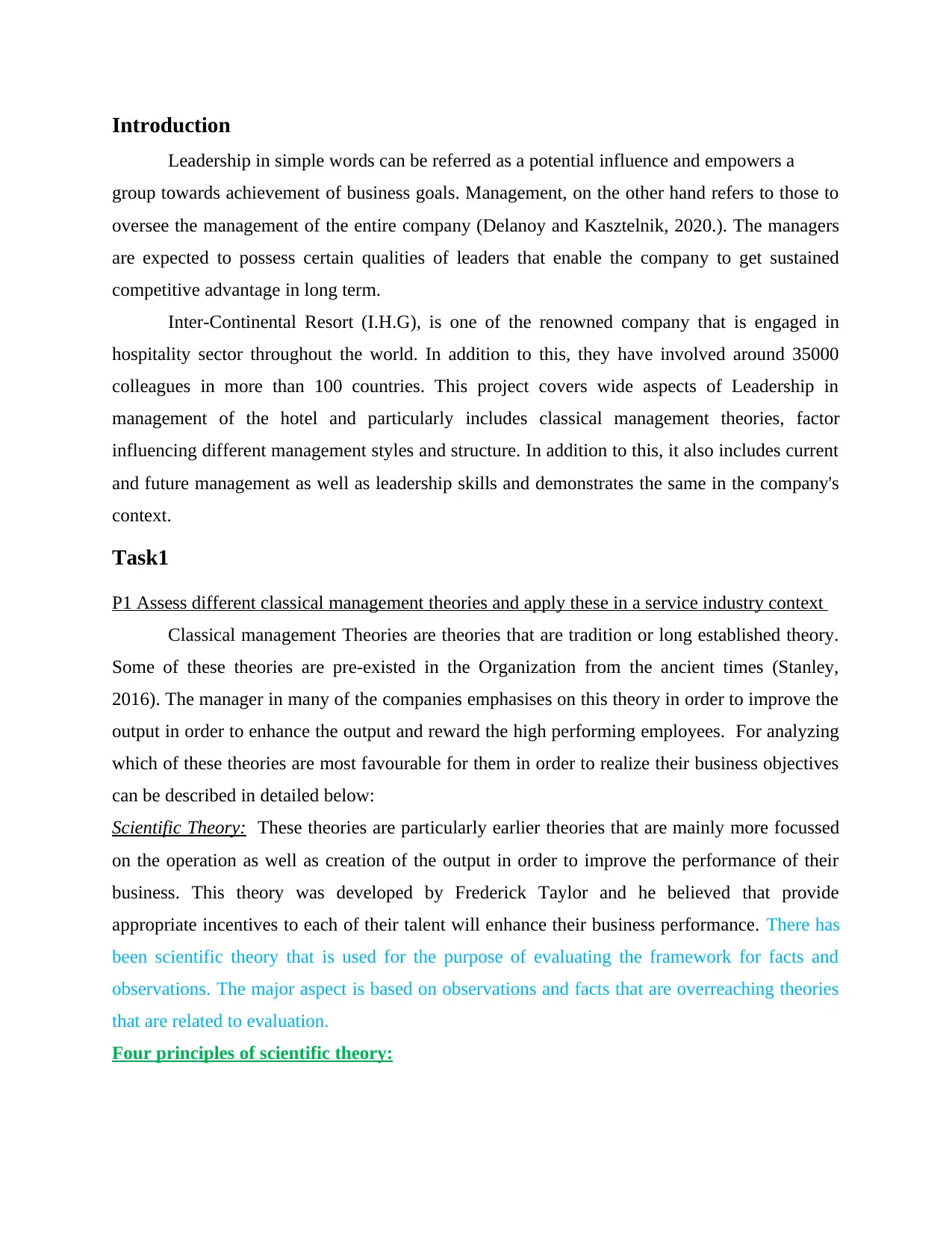
Introduction
Leadership in simple words can be referred as a potential influence and empowers a
group towards achievement of business goals. Management, on the other hand refers to those to
oversee the management of the entire company (Delanoy and Kasztelnik, 2020.). The managers
are expected to possess certain qualities of leaders that enable the company to get sustained
competitive advantage in long term.
Inter-Continental Resort (I.H.G), is one of the renowned company that is engaged in
hospitality sector throughout the world. In addition to this, they have involved around 35000
colleagues in more than 100 countries. This project covers wide aspects of Leadership in
management of the hotel and particularly includes classical management theories, factor
influencing different management styles and structure. In addition to this, it also includes current
and future management as well as leadership skills and demonstrates the same in the company's
context.
Task1
P1 Assess different classical management theories and apply these in a service industry context
Classical management Theories are theories that are tradition or long established theory.
Some of these theories are pre-existed in the Organization from the ancient times (Stanley,
2016). The manager in many of the companies emphasises on this theory in order to improve the
output in order to enhance the output and reward the high performing employees. For analyzing
which of these theories are most favourable for them in order to realize their business objectives
can be described in detailed below:
Scientific Theory: These theories are particularly earlier theories that are mainly more focussed
on the operation as well as creation of the output in order to improve the performance of their
business. This theory was developed by Frederick Taylor and he believed that provide
appropriate incentives to each of their talent will enhance their business performance. There has
been scientific theory that is used for the purpose of evaluating the framework for facts and
observations. The major aspect is based on observations and facts that are overreaching theories
that are related to evaluation.
Four principles of scientific theory:
Leadership in simple words can be referred as a potential influence and empowers a
group towards achievement of business goals. Management, on the other hand refers to those to
oversee the management of the entire company (Delanoy and Kasztelnik, 2020.). The managers
are expected to possess certain qualities of leaders that enable the company to get sustained
competitive advantage in long term.
Inter-Continental Resort (I.H.G), is one of the renowned company that is engaged in
hospitality sector throughout the world. In addition to this, they have involved around 35000
colleagues in more than 100 countries. This project covers wide aspects of Leadership in
management of the hotel and particularly includes classical management theories, factor
influencing different management styles and structure. In addition to this, it also includes current
and future management as well as leadership skills and demonstrates the same in the company's
context.
Task1
P1 Assess different classical management theories and apply these in a service industry context
Classical management Theories are theories that are tradition or long established theory.
Some of these theories are pre-existed in the Organization from the ancient times (Stanley,
2016). The manager in many of the companies emphasises on this theory in order to improve the
output in order to enhance the output and reward the high performing employees. For analyzing
which of these theories are most favourable for them in order to realize their business objectives
can be described in detailed below:
Scientific Theory: These theories are particularly earlier theories that are mainly more focussed
on the operation as well as creation of the output in order to improve the performance of their
business. This theory was developed by Frederick Taylor and he believed that provide
appropriate incentives to each of their talent will enhance their business performance. There has
been scientific theory that is used for the purpose of evaluating the framework for facts and
observations. The major aspect is based on observations and facts that are overreaching theories
that are related to evaluation.
Four principles of scientific theory:
⊘ This is a preview!⊘
Do you want full access?
Subscribe today to unlock all pages.

Trusted by 1+ million students worldwide
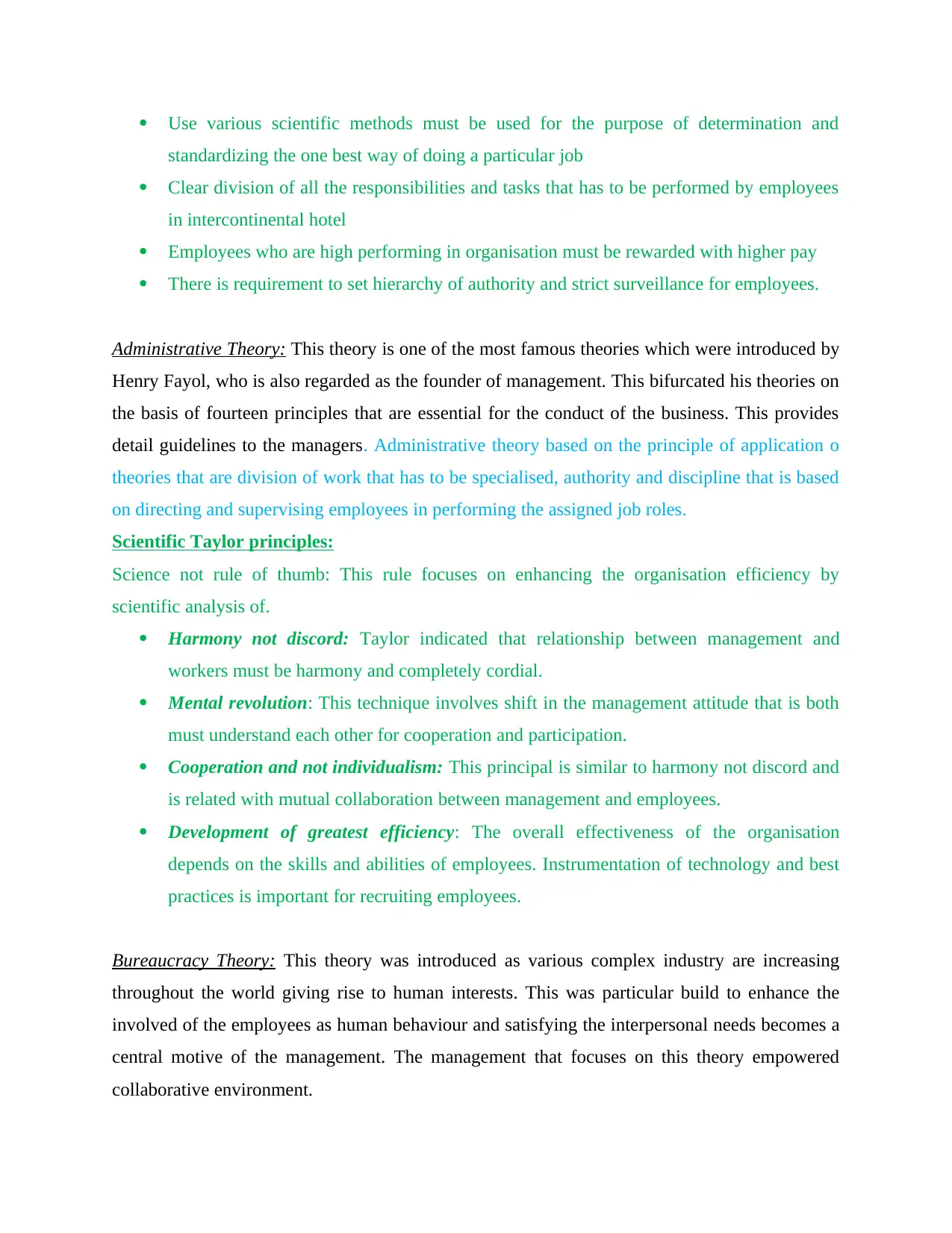
Use various scientific methods must be used for the purpose of determination and
standardizing the one best way of doing a particular job
Clear division of all the responsibilities and tasks that has to be performed by employees
in intercontinental hotel
Employees who are high performing in organisation must be rewarded with higher pay
There is requirement to set hierarchy of authority and strict surveillance for employees.
Administrative Theory: This theory is one of the most famous theories which were introduced by
Henry Fayol, who is also regarded as the founder of management. This bifurcated his theories on
the basis of fourteen principles that are essential for the conduct of the business. This provides
detail guidelines to the managers. Administrative theory based on the principle of application o
theories that are division of work that has to be specialised, authority and discipline that is based
on directing and supervising employees in performing the assigned job roles.
Scientific Taylor principles:
Science not rule of thumb: This rule focuses on enhancing the organisation efficiency by
scientific analysis of.
Harmony not discord: Taylor indicated that relationship between management and
workers must be harmony and completely cordial.
Mental revolution: This technique involves shift in the management attitude that is both
must understand each other for cooperation and participation.
Cooperation and not individualism: This principal is similar to harmony not discord and
is related with mutual collaboration between management and employees.
Development of greatest efficiency: The overall effectiveness of the organisation
depends on the skills and abilities of employees. Instrumentation of technology and best
practices is important for recruiting employees.
Bureaucracy Theory: This theory was introduced as various complex industry are increasing
throughout the world giving rise to human interests. This was particular build to enhance the
involved of the employees as human behaviour and satisfying the interpersonal needs becomes a
central motive of the management. The management that focuses on this theory empowered
collaborative environment.
standardizing the one best way of doing a particular job
Clear division of all the responsibilities and tasks that has to be performed by employees
in intercontinental hotel
Employees who are high performing in organisation must be rewarded with higher pay
There is requirement to set hierarchy of authority and strict surveillance for employees.
Administrative Theory: This theory is one of the most famous theories which were introduced by
Henry Fayol, who is also regarded as the founder of management. This bifurcated his theories on
the basis of fourteen principles that are essential for the conduct of the business. This provides
detail guidelines to the managers. Administrative theory based on the principle of application o
theories that are division of work that has to be specialised, authority and discipline that is based
on directing and supervising employees in performing the assigned job roles.
Scientific Taylor principles:
Science not rule of thumb: This rule focuses on enhancing the organisation efficiency by
scientific analysis of.
Harmony not discord: Taylor indicated that relationship between management and
workers must be harmony and completely cordial.
Mental revolution: This technique involves shift in the management attitude that is both
must understand each other for cooperation and participation.
Cooperation and not individualism: This principal is similar to harmony not discord and
is related with mutual collaboration between management and employees.
Development of greatest efficiency: The overall effectiveness of the organisation
depends on the skills and abilities of employees. Instrumentation of technology and best
practices is important for recruiting employees.
Bureaucracy Theory: This theory was introduced as various complex industry are increasing
throughout the world giving rise to human interests. This was particular build to enhance the
involved of the employees as human behaviour and satisfying the interpersonal needs becomes a
central motive of the management. The management that focuses on this theory empowered
collaborative environment.
Paraphrase This Document
Need a fresh take? Get an instant paraphrase of this document with our AI Paraphraser
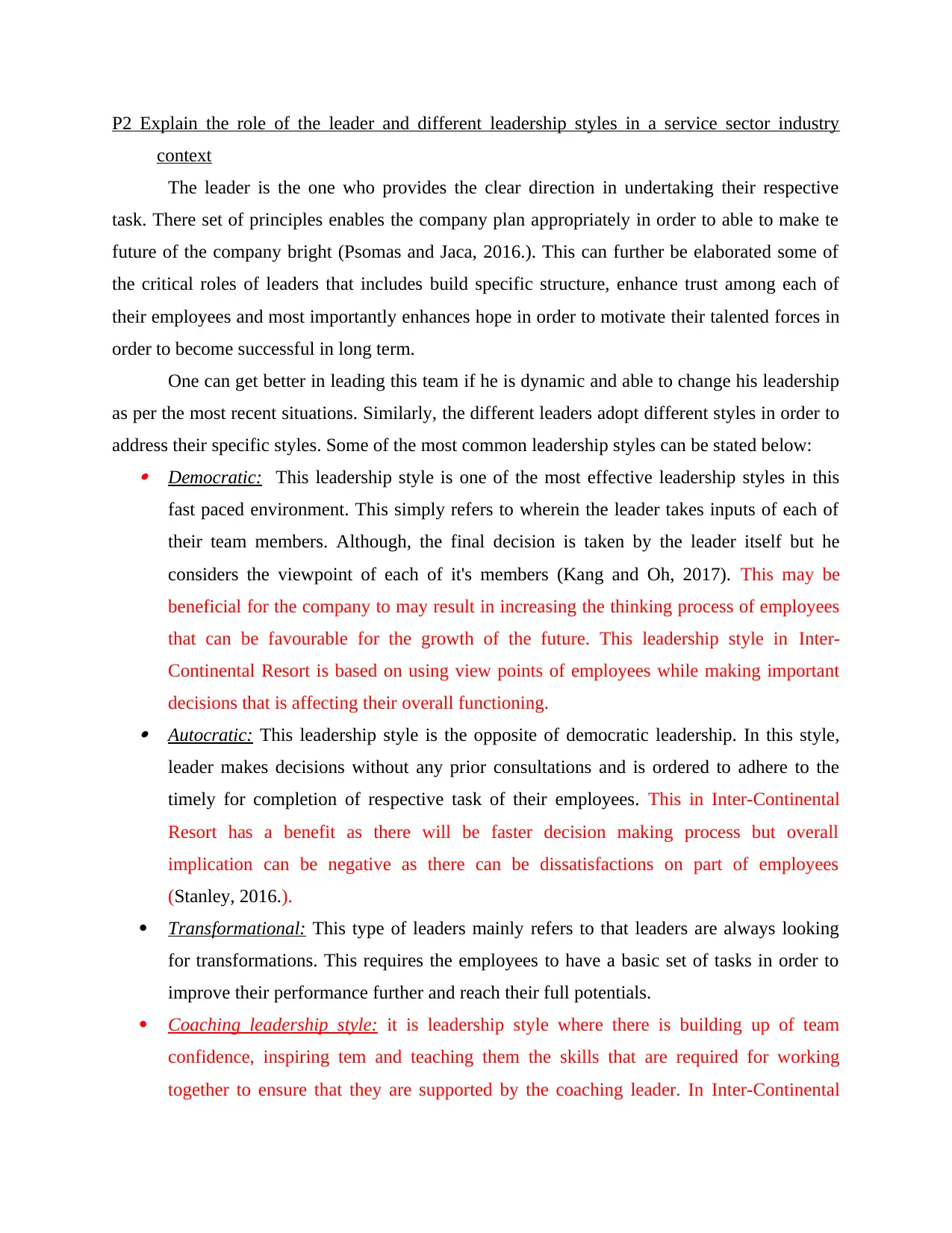
P2 Explain the role of the leader and different leadership styles in a service sector industry
context
The leader is the one who provides the clear direction in undertaking their respective
task. There set of principles enables the company plan appropriately in order to able to make te
future of the company bright (Psomas and Jaca, 2016.). This can further be elaborated some of
the critical roles of leaders that includes build specific structure, enhance trust among each of
their employees and most importantly enhances hope in order to motivate their talented forces in
order to become successful in long term.
One can get better in leading this team if he is dynamic and able to change his leadership
as per the most recent situations. Similarly, the different leaders adopt different styles in order to
address their specific styles. Some of the most common leadership styles can be stated below: Democratic: This leadership style is one of the most effective leadership styles in this
fast paced environment. This simply refers to wherein the leader takes inputs of each of
their team members. Although, the final decision is taken by the leader itself but he
considers the viewpoint of each of it's members (Kang and Oh, 2017). This may be
beneficial for the company to may result in increasing the thinking process of employees
that can be favourable for the growth of the future. This leadership style in Inter-
Continental Resort is based on using view points of employees while making important
decisions that is affecting their overall functioning. Autocratic: This leadership style is the opposite of democratic leadership. In this style,
leader makes decisions without any prior consultations and is ordered to adhere to the
timely for completion of respective task of their employees. This in Inter-Continental
Resort has a benefit as there will be faster decision making process but overall
implication can be negative as there can be dissatisfactions on part of employees
(Stanley, 2016.).
Transformational: This type of leaders mainly refers to that leaders are always looking
for transformations. This requires the employees to have a basic set of tasks in order to
improve their performance further and reach their full potentials.
Coaching leadership style: it is leadership style where there is building up of team
confidence, inspiring tem and teaching them the skills that are required for working
together to ensure that they are supported by the coaching leader. In Inter-Continental
context
The leader is the one who provides the clear direction in undertaking their respective
task. There set of principles enables the company plan appropriately in order to able to make te
future of the company bright (Psomas and Jaca, 2016.). This can further be elaborated some of
the critical roles of leaders that includes build specific structure, enhance trust among each of
their employees and most importantly enhances hope in order to motivate their talented forces in
order to become successful in long term.
One can get better in leading this team if he is dynamic and able to change his leadership
as per the most recent situations. Similarly, the different leaders adopt different styles in order to
address their specific styles. Some of the most common leadership styles can be stated below: Democratic: This leadership style is one of the most effective leadership styles in this
fast paced environment. This simply refers to wherein the leader takes inputs of each of
their team members. Although, the final decision is taken by the leader itself but he
considers the viewpoint of each of it's members (Kang and Oh, 2017). This may be
beneficial for the company to may result in increasing the thinking process of employees
that can be favourable for the growth of the future. This leadership style in Inter-
Continental Resort is based on using view points of employees while making important
decisions that is affecting their overall functioning. Autocratic: This leadership style is the opposite of democratic leadership. In this style,
leader makes decisions without any prior consultations and is ordered to adhere to the
timely for completion of respective task of their employees. This in Inter-Continental
Resort has a benefit as there will be faster decision making process but overall
implication can be negative as there can be dissatisfactions on part of employees
(Stanley, 2016.).
Transformational: This type of leaders mainly refers to that leaders are always looking
for transformations. This requires the employees to have a basic set of tasks in order to
improve their performance further and reach their full potentials.
Coaching leadership style: it is leadership style where there is building up of team
confidence, inspiring tem and teaching them the skills that are required for working
together to ensure that they are supported by the coaching leader. In Inter-Continental
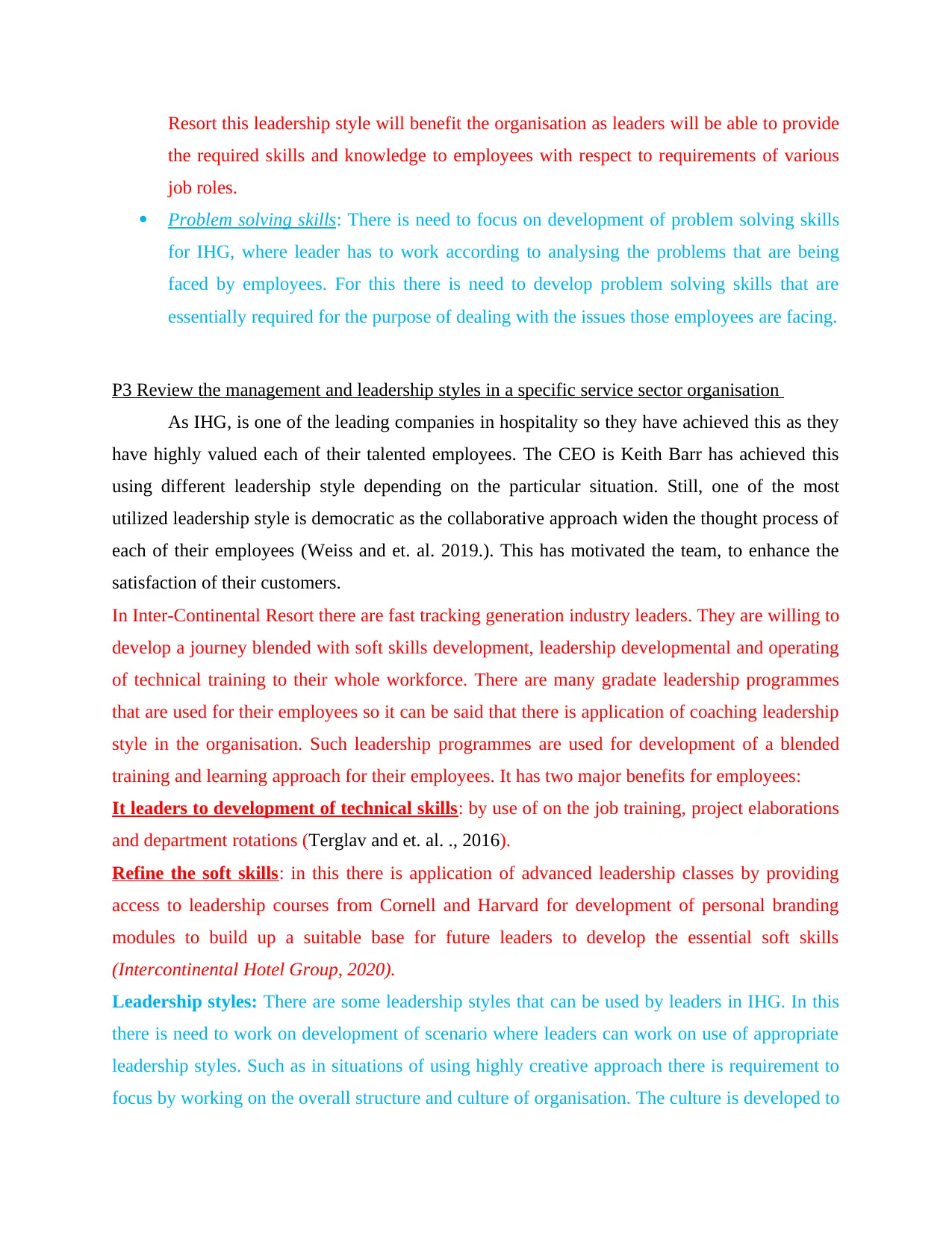
Resort this leadership style will benefit the organisation as leaders will be able to provide
the required skills and knowledge to employees with respect to requirements of various
job roles.
Problem solving skills: There is need to focus on development of problem solving skills
for IHG, where leader has to work according to analysing the problems that are being
faced by employees. For this there is need to develop problem solving skills that are
essentially required for the purpose of dealing with the issues those employees are facing.
P3 Review the management and leadership styles in a specific service sector organisation
As IHG, is one of the leading companies in hospitality so they have achieved this as they
have highly valued each of their talented employees. The CEO is Keith Barr has achieved this
using different leadership style depending on the particular situation. Still, one of the most
utilized leadership style is democratic as the collaborative approach widen the thought process of
each of their employees (Weiss and et. al. 2019.). This has motivated the team, to enhance the
satisfaction of their customers.
In Inter-Continental Resort there are fast tracking generation industry leaders. They are willing to
develop a journey blended with soft skills development, leadership developmental and operating
of technical training to their whole workforce. There are many gradate leadership programmes
that are used for their employees so it can be said that there is application of coaching leadership
style in the organisation. Such leadership programmes are used for development of a blended
training and learning approach for their employees. It has two major benefits for employees:
It leaders to development of technical skills: by use of on the job training, project elaborations
and department rotations (Terglav and et. al. ., 2016).
Refine the soft skills: in this there is application of advanced leadership classes by providing
access to leadership courses from Cornell and Harvard for development of personal branding
modules to build up a suitable base for future leaders to develop the essential soft skills
(Intercontinental Hotel Group, 2020).
Leadership styles: There are some leadership styles that can be used by leaders in IHG. In this
there is need to work on development of scenario where leaders can work on use of appropriate
leadership styles. Such as in situations of using highly creative approach there is requirement to
focus by working on the overall structure and culture of organisation. The culture is developed to
the required skills and knowledge to employees with respect to requirements of various
job roles.
Problem solving skills: There is need to focus on development of problem solving skills
for IHG, where leader has to work according to analysing the problems that are being
faced by employees. For this there is need to develop problem solving skills that are
essentially required for the purpose of dealing with the issues those employees are facing.
P3 Review the management and leadership styles in a specific service sector organisation
As IHG, is one of the leading companies in hospitality so they have achieved this as they
have highly valued each of their talented employees. The CEO is Keith Barr has achieved this
using different leadership style depending on the particular situation. Still, one of the most
utilized leadership style is democratic as the collaborative approach widen the thought process of
each of their employees (Weiss and et. al. 2019.). This has motivated the team, to enhance the
satisfaction of their customers.
In Inter-Continental Resort there are fast tracking generation industry leaders. They are willing to
develop a journey blended with soft skills development, leadership developmental and operating
of technical training to their whole workforce. There are many gradate leadership programmes
that are used for their employees so it can be said that there is application of coaching leadership
style in the organisation. Such leadership programmes are used for development of a blended
training and learning approach for their employees. It has two major benefits for employees:
It leaders to development of technical skills: by use of on the job training, project elaborations
and department rotations (Terglav and et. al. ., 2016).
Refine the soft skills: in this there is application of advanced leadership classes by providing
access to leadership courses from Cornell and Harvard for development of personal branding
modules to build up a suitable base for future leaders to develop the essential soft skills
(Intercontinental Hotel Group, 2020).
Leadership styles: There are some leadership styles that can be used by leaders in IHG. In this
there is need to work on development of scenario where leaders can work on use of appropriate
leadership styles. Such as in situations of using highly creative approach there is requirement to
focus by working on the overall structure and culture of organisation. The culture is developed to
⊘ This is a preview!⊘
Do you want full access?
Subscribe today to unlock all pages.

Trusted by 1+ million students worldwide
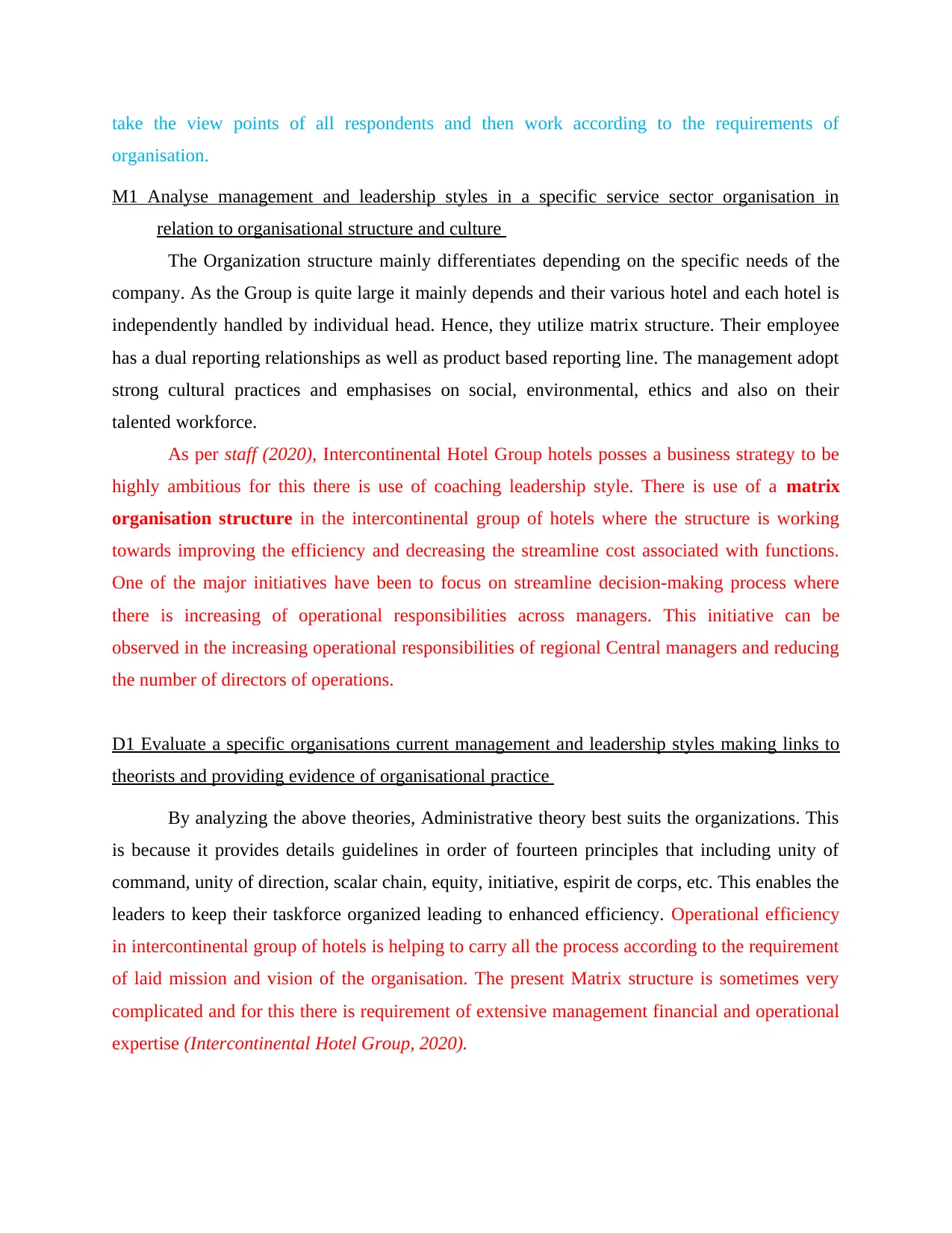
take the view points of all respondents and then work according to the requirements of
organisation.
M1 Analyse management and leadership styles in a specific service sector organisation in
relation to organisational structure and culture
The Organization structure mainly differentiates depending on the specific needs of the
company. As the Group is quite large it mainly depends and their various hotel and each hotel is
independently handled by individual head. Hence, they utilize matrix structure. Their employee
has a dual reporting relationships as well as product based reporting line. The management adopt
strong cultural practices and emphasises on social, environmental, ethics and also on their
talented workforce.
As per staff (2020), Intercontinental Hotel Group hotels posses a business strategy to be
highly ambitious for this there is use of coaching leadership style. There is use of a matrix
organisation structure in the intercontinental group of hotels where the structure is working
towards improving the efficiency and decreasing the streamline cost associated with functions.
One of the major initiatives have been to focus on streamline decision-making process where
there is increasing of operational responsibilities across managers. This initiative can be
observed in the increasing operational responsibilities of regional Central managers and reducing
the number of directors of operations.
D1 Evaluate a specific organisations current management and leadership styles making links to
theorists and providing evidence of organisational practice
By analyzing the above theories, Administrative theory best suits the organizations. This
is because it provides details guidelines in order of fourteen principles that including unity of
command, unity of direction, scalar chain, equity, initiative, espirit de corps, etc. This enables the
leaders to keep their taskforce organized leading to enhanced efficiency. Operational efficiency
in intercontinental group of hotels is helping to carry all the process according to the requirement
of laid mission and vision of the organisation. The present Matrix structure is sometimes very
complicated and for this there is requirement of extensive management financial and operational
expertise (Intercontinental Hotel Group, 2020).
organisation.
M1 Analyse management and leadership styles in a specific service sector organisation in
relation to organisational structure and culture
The Organization structure mainly differentiates depending on the specific needs of the
company. As the Group is quite large it mainly depends and their various hotel and each hotel is
independently handled by individual head. Hence, they utilize matrix structure. Their employee
has a dual reporting relationships as well as product based reporting line. The management adopt
strong cultural practices and emphasises on social, environmental, ethics and also on their
talented workforce.
As per staff (2020), Intercontinental Hotel Group hotels posses a business strategy to be
highly ambitious for this there is use of coaching leadership style. There is use of a matrix
organisation structure in the intercontinental group of hotels where the structure is working
towards improving the efficiency and decreasing the streamline cost associated with functions.
One of the major initiatives have been to focus on streamline decision-making process where
there is increasing of operational responsibilities across managers. This initiative can be
observed in the increasing operational responsibilities of regional Central managers and reducing
the number of directors of operations.
D1 Evaluate a specific organisations current management and leadership styles making links to
theorists and providing evidence of organisational practice
By analyzing the above theories, Administrative theory best suits the organizations. This
is because it provides details guidelines in order of fourteen principles that including unity of
command, unity of direction, scalar chain, equity, initiative, espirit de corps, etc. This enables the
leaders to keep their taskforce organized leading to enhanced efficiency. Operational efficiency
in intercontinental group of hotels is helping to carry all the process according to the requirement
of laid mission and vision of the organisation. The present Matrix structure is sometimes very
complicated and for this there is requirement of extensive management financial and operational
expertise (Intercontinental Hotel Group, 2020).
Paraphrase This Document
Need a fresh take? Get an instant paraphrase of this document with our AI Paraphraser
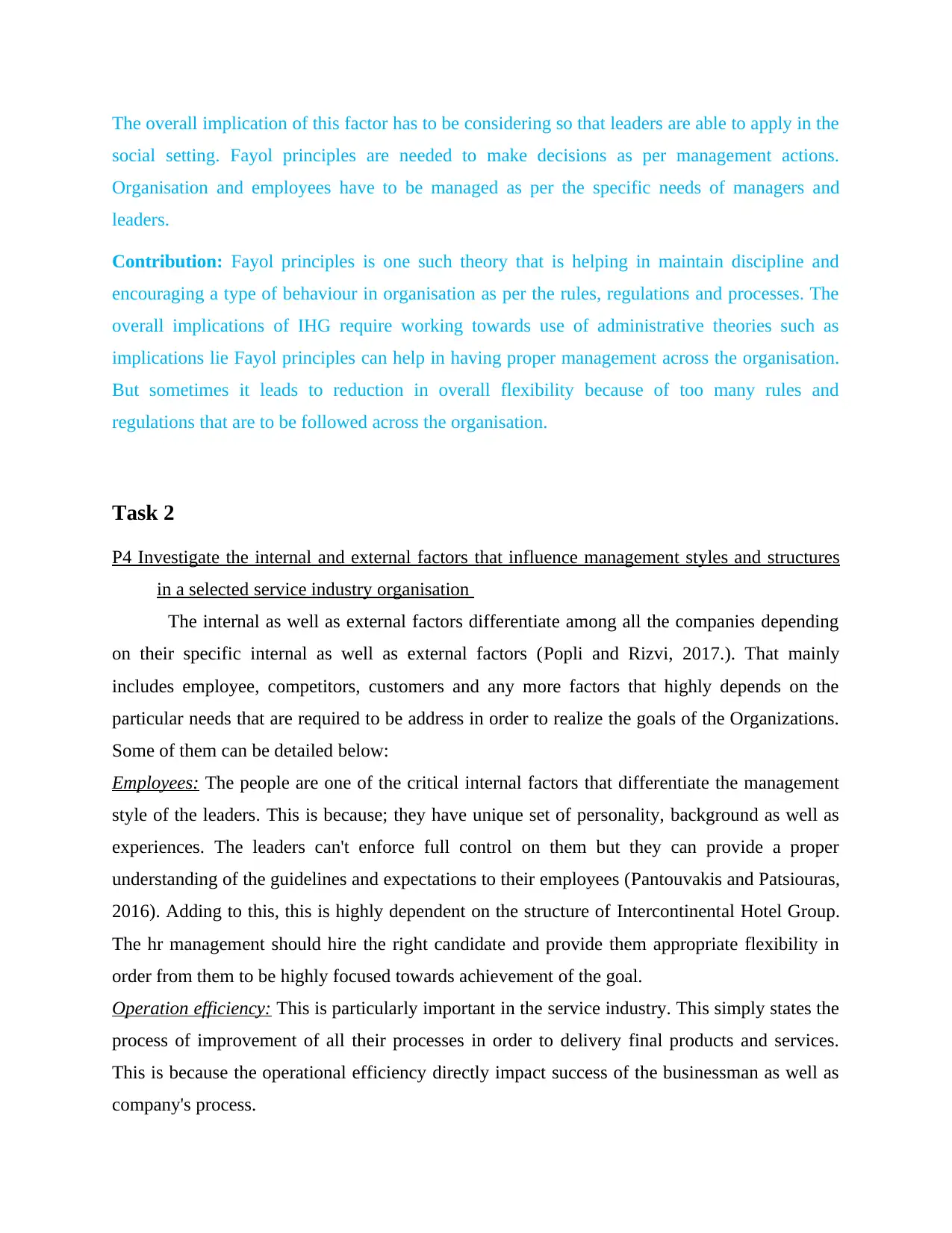
The overall implication of this factor has to be considering so that leaders are able to apply in the
social setting. Fayol principles are needed to make decisions as per management actions.
Organisation and employees have to be managed as per the specific needs of managers and
leaders.
Contribution: Fayol principles is one such theory that is helping in maintain discipline and
encouraging a type of behaviour in organisation as per the rules, regulations and processes. The
overall implications of IHG require working towards use of administrative theories such as
implications lie Fayol principles can help in having proper management across the organisation.
But sometimes it leads to reduction in overall flexibility because of too many rules and
regulations that are to be followed across the organisation.
Task 2
P4 Investigate the internal and external factors that influence management styles and structures
in a selected service industry organisation
The internal as well as external factors differentiate among all the companies depending
on their specific internal as well as external factors (Popli and Rizvi, 2017.). That mainly
includes employee, competitors, customers and any more factors that highly depends on the
particular needs that are required to be address in order to realize the goals of the Organizations.
Some of them can be detailed below:
Employees: The people are one of the critical internal factors that differentiate the management
style of the leaders. This is because; they have unique set of personality, background as well as
experiences. The leaders can't enforce full control on them but they can provide a proper
understanding of the guidelines and expectations to their employees (Pantouvakis and Patsiouras,
2016). Adding to this, this is highly dependent on the structure of Intercontinental Hotel Group.
The hr management should hire the right candidate and provide them appropriate flexibility in
order from them to be highly focused towards achievement of the goal.
Operation efficiency: This is particularly important in the service industry. This simply states the
process of improvement of all their processes in order to delivery final products and services.
This is because the operational efficiency directly impact success of the businessman as well as
company's process.
social setting. Fayol principles are needed to make decisions as per management actions.
Organisation and employees have to be managed as per the specific needs of managers and
leaders.
Contribution: Fayol principles is one such theory that is helping in maintain discipline and
encouraging a type of behaviour in organisation as per the rules, regulations and processes. The
overall implications of IHG require working towards use of administrative theories such as
implications lie Fayol principles can help in having proper management across the organisation.
But sometimes it leads to reduction in overall flexibility because of too many rules and
regulations that are to be followed across the organisation.
Task 2
P4 Investigate the internal and external factors that influence management styles and structures
in a selected service industry organisation
The internal as well as external factors differentiate among all the companies depending
on their specific internal as well as external factors (Popli and Rizvi, 2017.). That mainly
includes employee, competitors, customers and any more factors that highly depends on the
particular needs that are required to be address in order to realize the goals of the Organizations.
Some of them can be detailed below:
Employees: The people are one of the critical internal factors that differentiate the management
style of the leaders. This is because; they have unique set of personality, background as well as
experiences. The leaders can't enforce full control on them but they can provide a proper
understanding of the guidelines and expectations to their employees (Pantouvakis and Patsiouras,
2016). Adding to this, this is highly dependent on the structure of Intercontinental Hotel Group.
The hr management should hire the right candidate and provide them appropriate flexibility in
order from them to be highly focused towards achievement of the goal.
Operation efficiency: This is particularly important in the service industry. This simply states the
process of improvement of all their processes in order to delivery final products and services.
This is because the operational efficiency directly impact success of the businessman as well as
company's process.
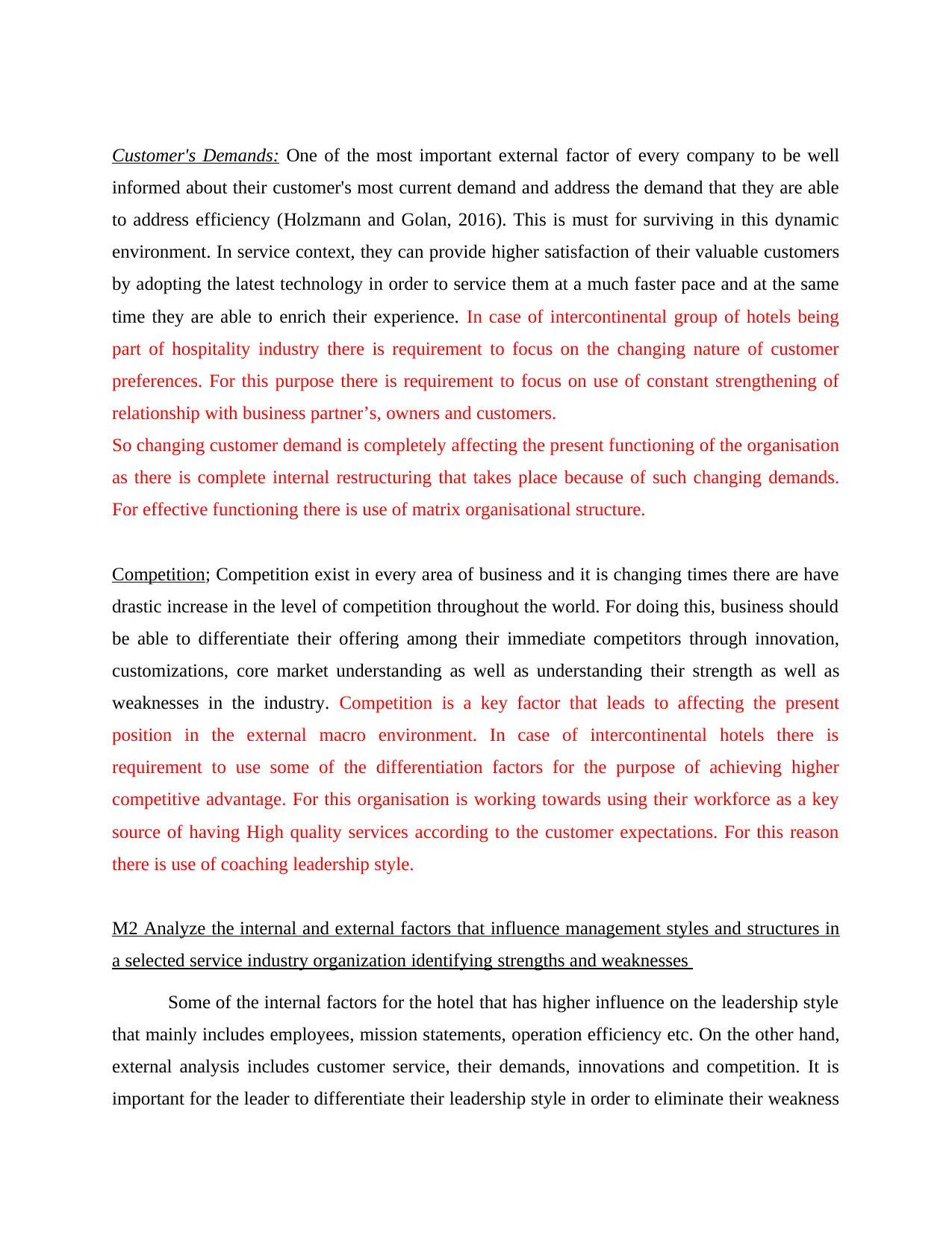
Customer's Demands: One of the most important external factor of every company to be well
informed about their customer's most current demand and address the demand that they are able
to address efficiency (Holzmann and Golan, 2016). This is must for surviving in this dynamic
environment. In service context, they can provide higher satisfaction of their valuable customers
by adopting the latest technology in order to service them at a much faster pace and at the same
time they are able to enrich their experience. In case of intercontinental group of hotels being
part of hospitality industry there is requirement to focus on the changing nature of customer
preferences. For this purpose there is requirement to focus on use of constant strengthening of
relationship with business partner’s, owners and customers.
So changing customer demand is completely affecting the present functioning of the organisation
as there is complete internal restructuring that takes place because of such changing demands.
For effective functioning there is use of matrix organisational structure.
Competition; Competition exist in every area of business and it is changing times there are have
drastic increase in the level of competition throughout the world. For doing this, business should
be able to differentiate their offering among their immediate competitors through innovation,
customizations, core market understanding as well as understanding their strength as well as
weaknesses in the industry. Competition is a key factor that leads to affecting the present
position in the external macro environment. In case of intercontinental hotels there is
requirement to use some of the differentiation factors for the purpose of achieving higher
competitive advantage. For this organisation is working towards using their workforce as a key
source of having High quality services according to the customer expectations. For this reason
there is use of coaching leadership style.
M2 Analyze the internal and external factors that influence management styles and structures in
a selected service industry organization identifying strengths and weaknesses
Some of the internal factors for the hotel that has higher influence on the leadership style
that mainly includes employees, mission statements, operation efficiency etc. On the other hand,
external analysis includes customer service, their demands, innovations and competition. It is
important for the leader to differentiate their leadership style in order to eliminate their weakness
informed about their customer's most current demand and address the demand that they are able
to address efficiency (Holzmann and Golan, 2016). This is must for surviving in this dynamic
environment. In service context, they can provide higher satisfaction of their valuable customers
by adopting the latest technology in order to service them at a much faster pace and at the same
time they are able to enrich their experience. In case of intercontinental group of hotels being
part of hospitality industry there is requirement to focus on the changing nature of customer
preferences. For this purpose there is requirement to focus on use of constant strengthening of
relationship with business partner’s, owners and customers.
So changing customer demand is completely affecting the present functioning of the organisation
as there is complete internal restructuring that takes place because of such changing demands.
For effective functioning there is use of matrix organisational structure.
Competition; Competition exist in every area of business and it is changing times there are have
drastic increase in the level of competition throughout the world. For doing this, business should
be able to differentiate their offering among their immediate competitors through innovation,
customizations, core market understanding as well as understanding their strength as well as
weaknesses in the industry. Competition is a key factor that leads to affecting the present
position in the external macro environment. In case of intercontinental hotels there is
requirement to use some of the differentiation factors for the purpose of achieving higher
competitive advantage. For this organisation is working towards using their workforce as a key
source of having High quality services according to the customer expectations. For this reason
there is use of coaching leadership style.
M2 Analyze the internal and external factors that influence management styles and structures in
a selected service industry organization identifying strengths and weaknesses
Some of the internal factors for the hotel that has higher influence on the leadership style
that mainly includes employees, mission statements, operation efficiency etc. On the other hand,
external analysis includes customer service, their demands, innovations and competition. It is
important for the leader to differentiate their leadership style in order to eliminate their weakness
⊘ This is a preview!⊘
Do you want full access?
Subscribe today to unlock all pages.

Trusted by 1+ million students worldwide
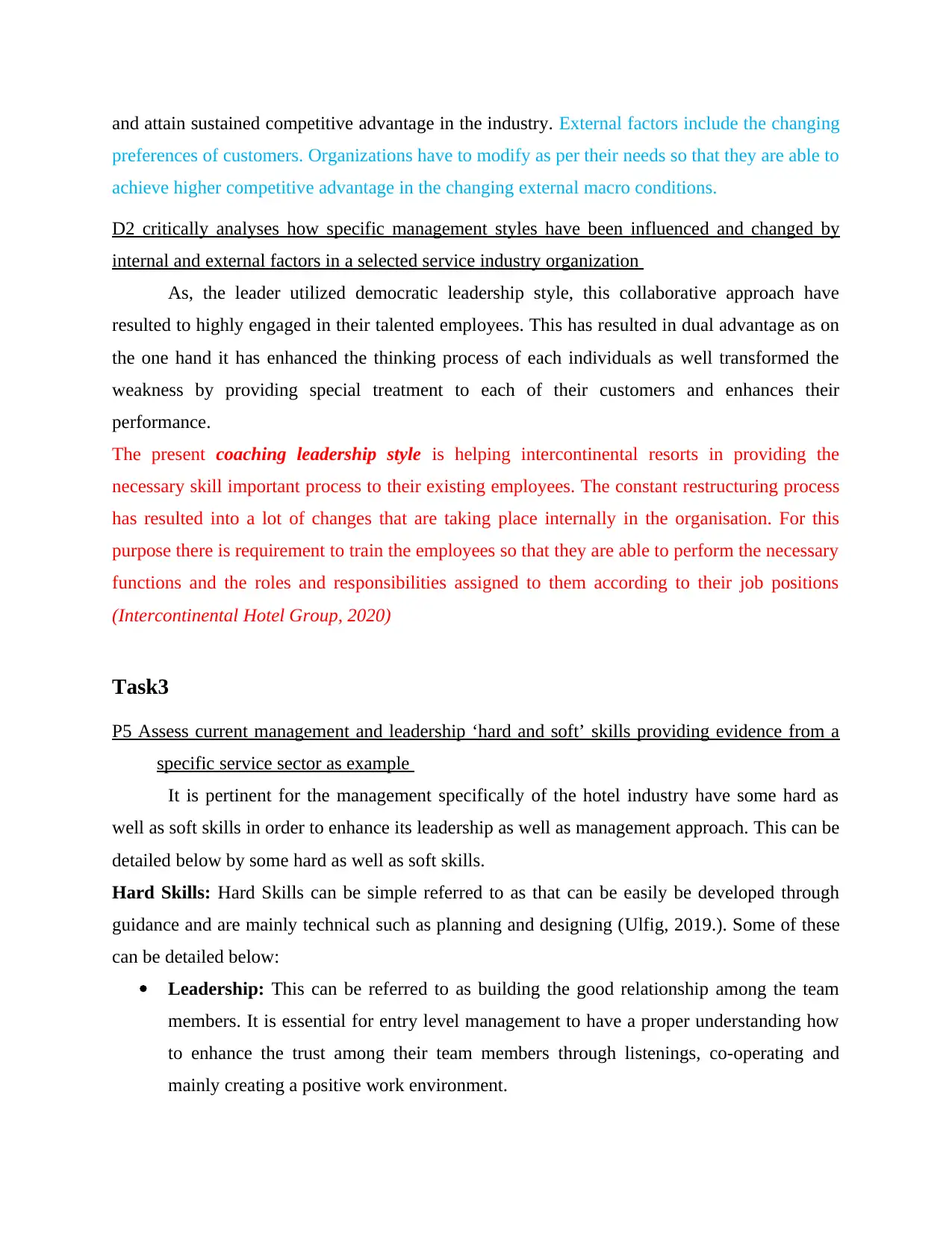
and attain sustained competitive advantage in the industry. External factors include the changing
preferences of customers. Organizations have to modify as per their needs so that they are able to
achieve higher competitive advantage in the changing external macro conditions.
D2 critically analyses how specific management styles have been influenced and changed by
internal and external factors in a selected service industry organization
As, the leader utilized democratic leadership style, this collaborative approach have
resulted to highly engaged in their talented employees. This has resulted in dual advantage as on
the one hand it has enhanced the thinking process of each individuals as well transformed the
weakness by providing special treatment to each of their customers and enhances their
performance.
The present coaching leadership style is helping intercontinental resorts in providing the
necessary skill important process to their existing employees. The constant restructuring process
has resulted into a lot of changes that are taking place internally in the organisation. For this
purpose there is requirement to train the employees so that they are able to perform the necessary
functions and the roles and responsibilities assigned to them according to their job positions
(Intercontinental Hotel Group, 2020)
Task3
P5 Assess current management and leadership ‘hard and soft’ skills providing evidence from a
specific service sector as example
It is pertinent for the management specifically of the hotel industry have some hard as
well as soft skills in order to enhance its leadership as well as management approach. This can be
detailed below by some hard as well as soft skills.
Hard Skills: Hard Skills can be simple referred to as that can be easily be developed through
guidance and are mainly technical such as planning and designing (Ulfig, 2019.). Some of these
can be detailed below:
Leadership: This can be referred to as building the good relationship among the team
members. It is essential for entry level management to have a proper understanding how
to enhance the trust among their team members through listenings, co-operating and
mainly creating a positive work environment.
preferences of customers. Organizations have to modify as per their needs so that they are able to
achieve higher competitive advantage in the changing external macro conditions.
D2 critically analyses how specific management styles have been influenced and changed by
internal and external factors in a selected service industry organization
As, the leader utilized democratic leadership style, this collaborative approach have
resulted to highly engaged in their talented employees. This has resulted in dual advantage as on
the one hand it has enhanced the thinking process of each individuals as well transformed the
weakness by providing special treatment to each of their customers and enhances their
performance.
The present coaching leadership style is helping intercontinental resorts in providing the
necessary skill important process to their existing employees. The constant restructuring process
has resulted into a lot of changes that are taking place internally in the organisation. For this
purpose there is requirement to train the employees so that they are able to perform the necessary
functions and the roles and responsibilities assigned to them according to their job positions
(Intercontinental Hotel Group, 2020)
Task3
P5 Assess current management and leadership ‘hard and soft’ skills providing evidence from a
specific service sector as example
It is pertinent for the management specifically of the hotel industry have some hard as
well as soft skills in order to enhance its leadership as well as management approach. This can be
detailed below by some hard as well as soft skills.
Hard Skills: Hard Skills can be simple referred to as that can be easily be developed through
guidance and are mainly technical such as planning and designing (Ulfig, 2019.). Some of these
can be detailed below:
Leadership: This can be referred to as building the good relationship among the team
members. It is essential for entry level management to have a proper understanding how
to enhance the trust among their team members through listenings, co-operating and
mainly creating a positive work environment.
Paraphrase This Document
Need a fresh take? Get an instant paraphrase of this document with our AI Paraphraser
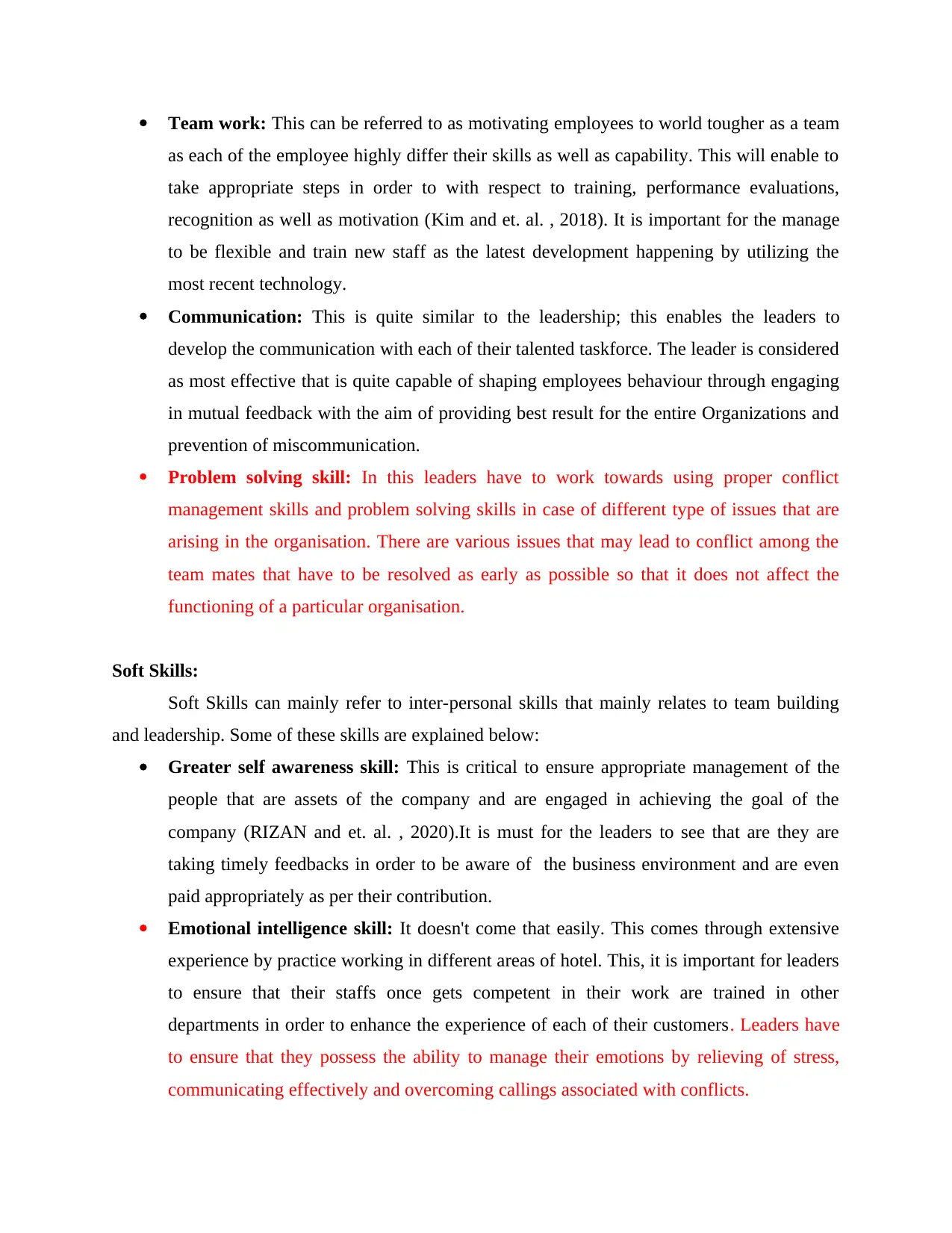
Team work: This can be referred to as motivating employees to world tougher as a team
as each of the employee highly differ their skills as well as capability. This will enable to
take appropriate steps in order to with respect to training, performance evaluations,
recognition as well as motivation (Kim and et. al. , 2018). It is important for the manage
to be flexible and train new staff as the latest development happening by utilizing the
most recent technology.
Communication: This is quite similar to the leadership; this enables the leaders to
develop the communication with each of their talented taskforce. The leader is considered
as most effective that is quite capable of shaping employees behaviour through engaging
in mutual feedback with the aim of providing best result for the entire Organizations and
prevention of miscommunication.
Problem solving skill: In this leaders have to work towards using proper conflict
management skills and problem solving skills in case of different type of issues that are
arising in the organisation. There are various issues that may lead to conflict among the
team mates that have to be resolved as early as possible so that it does not affect the
functioning of a particular organisation.
Soft Skills:
Soft Skills can mainly refer to inter-personal skills that mainly relates to team building
and leadership. Some of these skills are explained below:
Greater self awareness skill: This is critical to ensure appropriate management of the
people that are assets of the company and are engaged in achieving the goal of the
company (RIZAN and et. al. , 2020).It is must for the leaders to see that are they are
taking timely feedbacks in order to be aware of the business environment and are even
paid appropriately as per their contribution.
Emotional intelligence skill: It doesn't come that easily. This comes through extensive
experience by practice working in different areas of hotel. This, it is important for leaders
to ensure that their staffs once gets competent in their work are trained in other
departments in order to enhance the experience of each of their customers. Leaders have
to ensure that they possess the ability to manage their emotions by relieving of stress,
communicating effectively and overcoming callings associated with conflicts.
as each of the employee highly differ their skills as well as capability. This will enable to
take appropriate steps in order to with respect to training, performance evaluations,
recognition as well as motivation (Kim and et. al. , 2018). It is important for the manage
to be flexible and train new staff as the latest development happening by utilizing the
most recent technology.
Communication: This is quite similar to the leadership; this enables the leaders to
develop the communication with each of their talented taskforce. The leader is considered
as most effective that is quite capable of shaping employees behaviour through engaging
in mutual feedback with the aim of providing best result for the entire Organizations and
prevention of miscommunication.
Problem solving skill: In this leaders have to work towards using proper conflict
management skills and problem solving skills in case of different type of issues that are
arising in the organisation. There are various issues that may lead to conflict among the
team mates that have to be resolved as early as possible so that it does not affect the
functioning of a particular organisation.
Soft Skills:
Soft Skills can mainly refer to inter-personal skills that mainly relates to team building
and leadership. Some of these skills are explained below:
Greater self awareness skill: This is critical to ensure appropriate management of the
people that are assets of the company and are engaged in achieving the goal of the
company (RIZAN and et. al. , 2020).It is must for the leaders to see that are they are
taking timely feedbacks in order to be aware of the business environment and are even
paid appropriately as per their contribution.
Emotional intelligence skill: It doesn't come that easily. This comes through extensive
experience by practice working in different areas of hotel. This, it is important for leaders
to ensure that their staffs once gets competent in their work are trained in other
departments in order to enhance the experience of each of their customers. Leaders have
to ensure that they possess the ability to manage their emotions by relieving of stress,
communicating effectively and overcoming callings associated with conflicts.
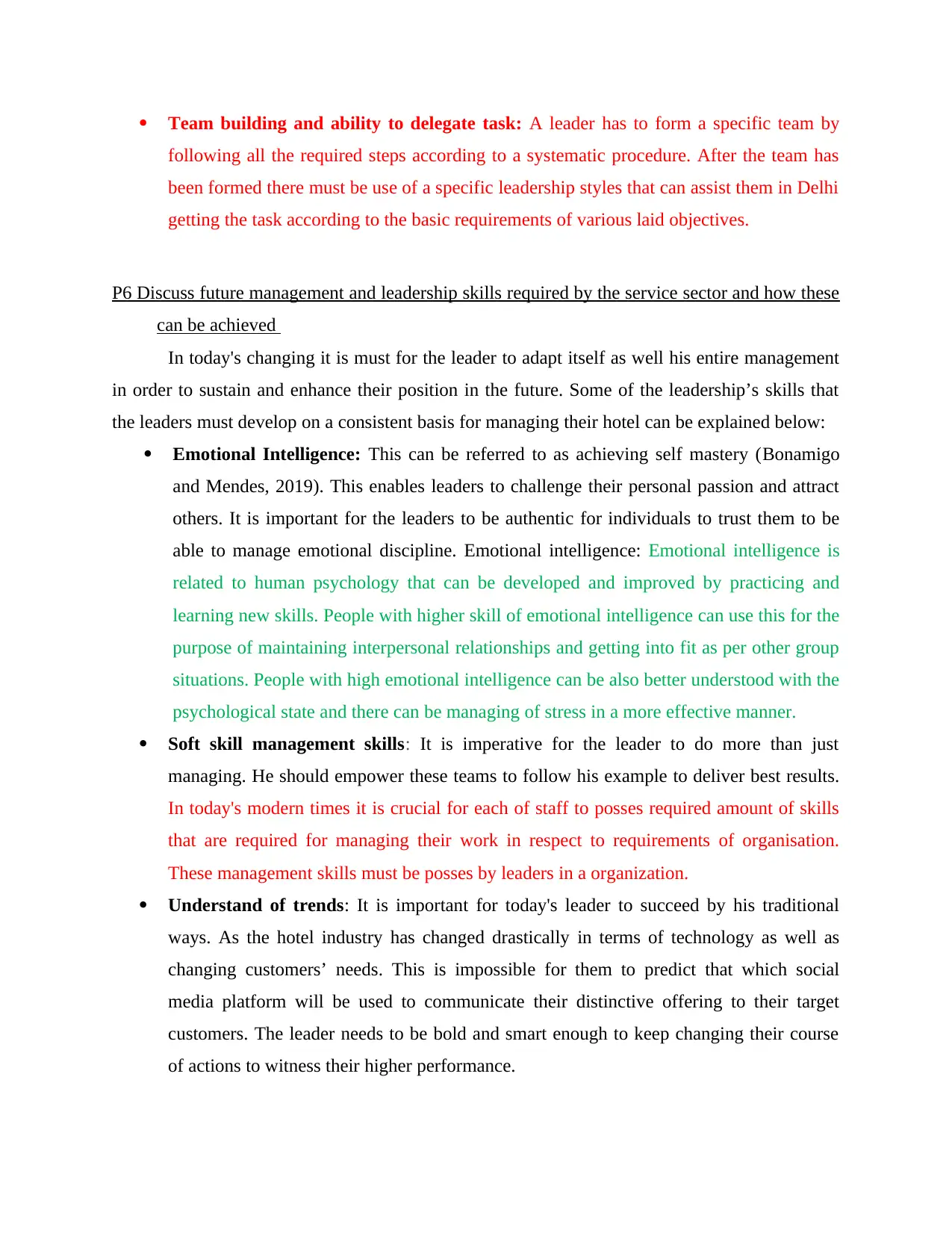
Team building and ability to delegate task: A leader has to form a specific team by
following all the required steps according to a systematic procedure. After the team has
been formed there must be use of a specific leadership styles that can assist them in Delhi
getting the task according to the basic requirements of various laid objectives.
P6 Discuss future management and leadership skills required by the service sector and how these
can be achieved
In today's changing it is must for the leader to adapt itself as well his entire management
in order to sustain and enhance their position in the future. Some of the leadership’s skills that
the leaders must develop on a consistent basis for managing their hotel can be explained below:
Emotional Intelligence: This can be referred to as achieving self mastery (Bonamigo
and Mendes, 2019). This enables leaders to challenge their personal passion and attract
others. It is important for the leaders to be authentic for individuals to trust them to be
able to manage emotional discipline. Emotional intelligence: Emotional intelligence is
related to human psychology that can be developed and improved by practicing and
learning new skills. People with higher skill of emotional intelligence can use this for the
purpose of maintaining interpersonal relationships and getting into fit as per other group
situations. People with high emotional intelligence can be also better understood with the
psychological state and there can be managing of stress in a more effective manner.
Soft skill management skills: It is imperative for the leader to do more than just
managing. He should empower these teams to follow his example to deliver best results.
In today's modern times it is crucial for each of staff to posses required amount of skills
that are required for managing their work in respect to requirements of organisation.
These management skills must be posses by leaders in a organization.
Understand of trends: It is important for today's leader to succeed by his traditional
ways. As the hotel industry has changed drastically in terms of technology as well as
changing customers’ needs. This is impossible for them to predict that which social
media platform will be used to communicate their distinctive offering to their target
customers. The leader needs to be bold and smart enough to keep changing their course
of actions to witness their higher performance.
following all the required steps according to a systematic procedure. After the team has
been formed there must be use of a specific leadership styles that can assist them in Delhi
getting the task according to the basic requirements of various laid objectives.
P6 Discuss future management and leadership skills required by the service sector and how these
can be achieved
In today's changing it is must for the leader to adapt itself as well his entire management
in order to sustain and enhance their position in the future. Some of the leadership’s skills that
the leaders must develop on a consistent basis for managing their hotel can be explained below:
Emotional Intelligence: This can be referred to as achieving self mastery (Bonamigo
and Mendes, 2019). This enables leaders to challenge their personal passion and attract
others. It is important for the leaders to be authentic for individuals to trust them to be
able to manage emotional discipline. Emotional intelligence: Emotional intelligence is
related to human psychology that can be developed and improved by practicing and
learning new skills. People with higher skill of emotional intelligence can use this for the
purpose of maintaining interpersonal relationships and getting into fit as per other group
situations. People with high emotional intelligence can be also better understood with the
psychological state and there can be managing of stress in a more effective manner.
Soft skill management skills: It is imperative for the leader to do more than just
managing. He should empower these teams to follow his example to deliver best results.
In today's modern times it is crucial for each of staff to posses required amount of skills
that are required for managing their work in respect to requirements of organisation.
These management skills must be posses by leaders in a organization.
Understand of trends: It is important for today's leader to succeed by his traditional
ways. As the hotel industry has changed drastically in terms of technology as well as
changing customers’ needs. This is impossible for them to predict that which social
media platform will be used to communicate their distinctive offering to their target
customers. The leader needs to be bold and smart enough to keep changing their course
of actions to witness their higher performance.
⊘ This is a preview!⊘
Do you want full access?
Subscribe today to unlock all pages.

Trusted by 1+ million students worldwide
1 out of 20
Related Documents
Your All-in-One AI-Powered Toolkit for Academic Success.
+13062052269
info@desklib.com
Available 24*7 on WhatsApp / Email
![[object Object]](/_next/static/media/star-bottom.7253800d.svg)
Unlock your academic potential
Copyright © 2020–2025 A2Z Services. All Rights Reserved. Developed and managed by ZUCOL.





